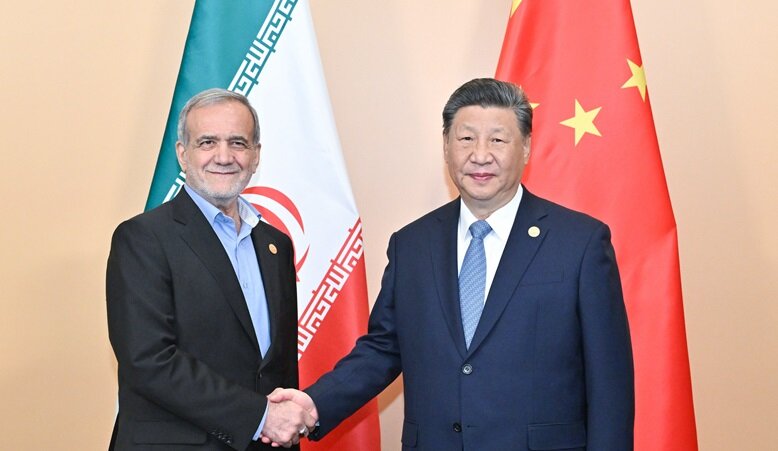On the president’s visit to China

TEHRAN – China is set to host two major international events in the near future: the Shanghai Cooperation Organization (SCO) Summit and the commemoration of the 80th anniversary of the end of World War II.
These events come at a time when the global order—its structures, norms, and even the very instruments once relied upon in earlier systems—has entered a phase of profound transformation, driven by sharp competition among great powers. Various regions of the world, particularly West Asia, are experiencing the often bloody consequences of these complex shifts.
The Islamic Republic of Iran has resolved to participate at the highest level in these critical gatherings, underscoring its determination to contribute meaningfully to shaping the emerging international order. From this perspective, and given the exceptional global circumstances, the visit of Dr. Masoud Pezeshkian, President of the Islamic Republic of Iran, to China carries significant weight—both in terms of international and regional developments and in the context of Iran–China bilateral relations.
It is expected that during this visit, Iran’s messages, positions, and expectations concerning the global order and regional dynamics will be clearly conveyed, opening a new chapter in bilateral ties with China. In his meetings with senior Chinese officials, the groundwork is anticipated to be laid for guiding the already strong partnership between Tehran and Beijing in a way that reflects the realities and imperatives of today’s world. The success of this trip, particularly on the bilateral front, will depend on Iran’s ability to convincingly communicate four essential messages to China’s leadership:
1. The political system of the Islamic Republic of Iran, rooted in popular legitimacy and supported by both its endogenous hard and soft power, is far too resilient to be shaken by Israel’s hybrid terrorist and aerial operations, even when coordinated with targeted U.S. strikes. Iran’s sources of stability are internal, grounded in its people and in a governance system based on religious democracy.
2. Iran believes that the era of bipolar confrontation, as well as the globalization paradigm once led by the United States, has come to an end. A new era has begun—one defined by fierce strategic rivalry among major powers. The United States, once the self-declared leader of the “global village” and champion of globalization, has abandoned the very rules and norms it once promoted. Today, Washington, together with some of its allies, pursues only the preservation of its hegemony, often through highly dangerous and at times bloody disorder. By contrast, a growing bloc of states advocates for a pragmatic transition toward a multipolar world that elevates the standing of the Global South. Aligned with the foundational principles of the Islamic Revolution and the will of its people, the Islamic Republic of Iran stands ready to play an active role in advancing such a system to the benefit of this bloc.
3. With U.S. backing, West Asia has become one of the central arenas of confrontation between the United States and the multipolar bloc. Israel’s aggression against Iran must be understood in this context. Responding to Israel’s repeated violations, including genocide and atrocities in Gaza, the systematic infringement of Syria’s territorial integrity through repeated strikes, continued attacks on Lebanon, and territorial claims against other regional states, cannot be confined to a regional framework. These actions constitute a global challenge. It is therefore incumbent upon the major powers that advocate for a multipolar world order to recognize this reality and fulfill their responsibilities accordingly.
4. The most serious threat to Iran’s national security and stability lies in its economic vulnerabilities—weaknesses that have emboldened the United States and Israel to attempt fresh military and security disruptions. This fragility has its roots in Iran’s decade-long exclusion from global development corridors and its gradual marginalization from global value chains. Today, however, Iran is working to recalibrate its development outlook, seeking to adapt itself to the requirements of the yet-unformed global order. Its strategy rests on harnessing domestic economic strengths while pursuing win–win partnerships with countries of the Global South.
Despite the insecurity and instability fueled in West Asia by U.S. policies executed through Israel—and despite Iran’s determined resistance to them—Tehran is committed to accelerating its development and modernization. For this purpose, Iran is prioritizing rapid planning and implementation of multilateral cooperation through frameworks such as BRICS and the Shanghai Cooperation Organization, while simultaneously expanding bilateral relations with friendly and like-minded states.
In this context, a critical question arises: as one of the leading powers of the Global South, what role does China envision for itself in this new path chosen by Iran? How, and under what terms, will Beijing engage in a serious, comprehensive partnership with Tehran—one that draws fully on their shared capacities and contributes to the realization of a multipolar world order and the empowerment of the Global South?
